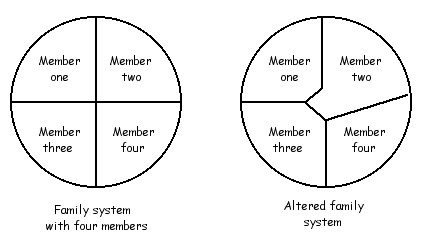Family systems theory as described by Haley (1980) provides further insight into how people can display suicidal behaviour and not necessarily have made the suicide decision. In any relationship with two or more people there is a ‘system’ that develops between them. When the two (or more) personalities meet, over time they work out how to be in the relationship for them. For example one party will take over some roles and the other party will take over other roles.
This can be described in terms of ego states. In a relationship between mother and son the mother may take over the Parent and Adult ego states in the relationship and the son may respond primarily from Rebellious Child ego state. Over time they will work this out often with both parties not even being aware of it. In a family of five members each one will also work out their various roles and positions in the family.

All families develop a system that works for them
Some family systems operate such that one party needs to be ill. If the daughter of the family is ill then all the other family members know what to do in terms of their roles and responsibilities. Examples of types of illness that can originate from a dysfunctional family system can be self harming, drug use, depression and panic attacks eating disorders and suicidal behaviour.
In such circumstances if the daughter is making suicidal statements, gestures or attempts then that is how that family functions. For instance mother and father may start to co-operate and unite against the common cause of the daughters suicidal ‘illness’. It allows them to focus on the daughter and thus they can put to the side their own marital problems.
If the daughter stops making suicidal gestures then mother and father are again confronted with their own relationship so there can be subtle pressure on the daughter to remain suicidal. Having worked in drug rehabilitation this is not an uncommon scenario when one hears the drug user refer to himself as the black sheep of the family.

In such situations when working with the suicidal daughter one can encounter resistance from other family members because if the daughter changes (ie stops being suicidal) then the whole family system has to change. Every person has to alter to some extent and systems will resist change as they strive to achieve homeostasis. Some only have to alter slightly and those who have considerable psychological investment in the daughter being suicidal may be quite resistant to the change.
Treatment of such suicidal people is thus complicated as it involves the person restructuring their relationship with the other family members and that maybe difficult especially if the child is living at home and cannot move out. This also provides an extra avenue of investigation when making a suicide risk assessment.
As is common in the field of psychology often the different approaches whether they may be psychodynamic, organic or systems all tend to take the stance of one size fits all. In this instance all suicidal people are a result of a dysfunctional family system. It is indeed unfortunate how the alternative theories do this as with the human psyche, rarely one size fits all. From my experience of working with the suicidal sometimes the family system is very important and at other times it is only a minor influence. However in assessing and understanding the suicidal person it is very wise to make an assessment of how the suicidal thoughts and behaviour fit for the family system that the person currently lives in.

It is also possible for the individual to have made the suicide decision in childhood and be in a family system where they take the sick role of being suicidal. If that is the case then the risk level of a suicide attempt would certainly increase.
In systems theory every system is naturally homeostatic and will seek to balance itself. Thus it will also avoid or resist change as the balance is disrupted and it is not homeostatic.

So if family member number two changes then that forces all other members to change in some way as well. That change can be anything such as becoming depressed, stop being bulimic, start taking drugs, winning the lottery to becoming assertive. If you change then the system becomes unbalanced and all others have to change so that they system can become homeostatic again.
If you are feeling depressed or anxious that means all those in your ‘family system’, or your inner circle of closest people, are in some way contributing to your depression or anxiety. Indeed if you are feeling happy and joyous they are also contributing to that as well. In systems theory there is no such thing as an ill person, instead it is the system that is ill. If your partner is suffering depression then you are contributing to that in some way as part of the system.
Graffiti


0 comments:
Post a Comment